Republicans want to win school boards. They're winning in white counties by running on race.
- Oops!Something went wrong.Please try again later.
School board contests this election season have the look and feel of the kind of partisan sparring once reserved for top-of-ballot races, complete with party endorsements for what are mostly nonpartisan races and eye-popping sums fueling some campaigns.
The sometimes little-noticed races present an opportunity, Republican leaders say, to oversee what children are taught and advance a broader conservative agenda. Frustration with pandemic restrictions, teaching about civil rights and allowing accommodations for transgender students are among the animating issues for GOP-backed candidates, many of them new to politics or education policy.
Already, some of these candidates have won big, taking over school boards in majority-white pockets of the country, buoyed by national money and big-name endorsements.
Republicans are following the blueprint left by former President Donald Trump, who banned racial sensitivity training in the federal government, criticized Black Lives Matter social justice protesters and called for the nation’s schools to adopt a “patriotic education." Critics of Trump's education plan said it whitewashed the country’s history.
Since 2021, schools ban more than 1600 books: It's all part of a 'full-fledged' movement.
Groups including Moms for Liberty and local political action committees are also helping drive interest in these races. They are endorsing and raising money for candidates, many of whom reject schools' coronavirus precautions and what students are learning about race.
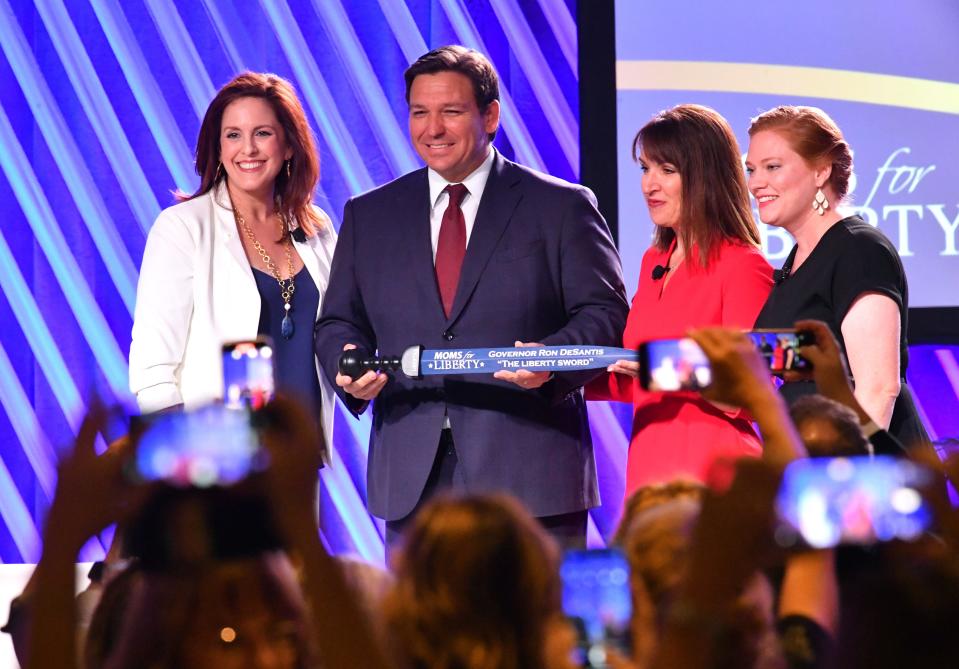
The 1776 Project PAC, a national group also endorsing and supporting candidates in states including Colorado, New Jersey and Pennsylvania – all of which voted for President Joe Biden in 2020 – said more than two-thirds of its candidates have won since 2021.
Elections tracking site Ballotpedia found earlier this year that school board incumbents who supported some politically charged issues, such as COVID-19 restrictions, teaching about sex and offering gender-neutral facilities or teaching about race in the classroom – wrongly labeled by some as critical race theory, or CRT – were nearly twice as likely to lose their races compared with the loss rates of past candidates.
The rhetoric and spending this cycle are unsettling to Dan Domenech, the executive director of the AASA, the School Superintendents Association, who spent nearly three decades as an educator and school district leader. The American education system, he said, is decentralized by design to allow local parents to decide what’s best for their children – independent of national trends.
“There’s no question school boards are the target of takeovers,” Domenech said. “The localities are losing control, and it’s national movements that are taking over. That’s totally contrary to the whole rationale behind how our school systems are developed.”
Education policy has always been political, countered Ryan Girdusky, head of the 1776 Project PAC. He pointed to teachers unions ejecting communists in the 1940s and the efforts of evangelicals to take over school boards in the 1970s. Teachers unions today, he said, also spend money on local races and have endorsed candidates for years.
“They’re saying 'This is a brand new thing I just thought of,' when I am just following a very long trend,” Girdusky said. “It’s intrinsically political, public education.
"It always has been.”
Conservative wins can lead to new policies on controversial topics
In the Woodland Park School District, outside of Colorado Springs, Colorado, four newcomer candidates with skeptical views of critical race theory challenged incumbents on the five-person board last November. Some campaigned with signs that read "Conservative for School Board," and the local Republican Party donated to all four challengers. The small school district, with about 2,000 students, is located in Teller County, where roughly 86% of the area's 25,000 residents identify as white only.
All four won.
Local parents then tried to recall three of the newly elected board members, calling them negligent and operating without transparency, but they couldn't gather enough signatures to call an election. The superintendent left his post in July, though he will serve in a transitional role into 2023. Mathew Neal told the Pike Peaks Courier his departure was unplanned.
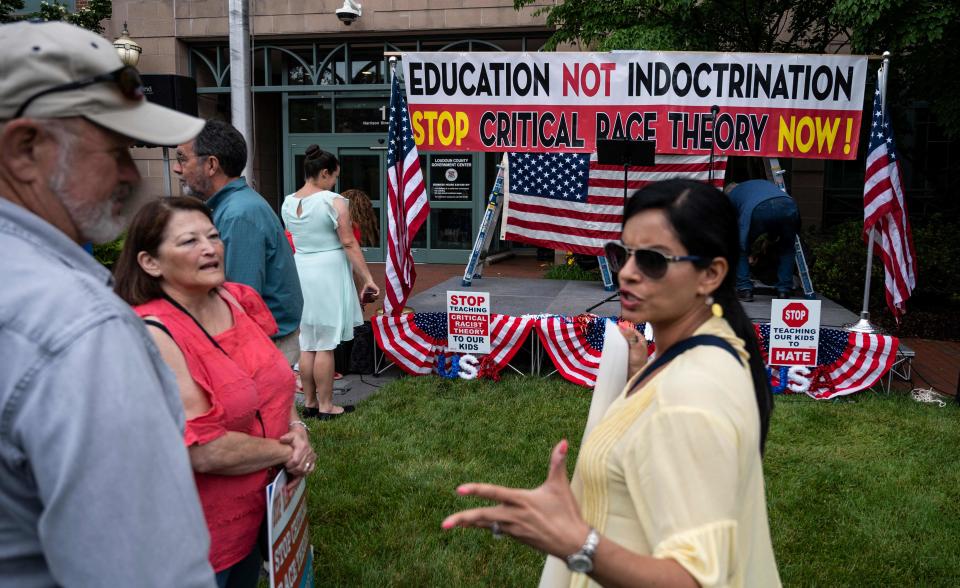
New board Vice President David Illingworth II ran a campaign touting his right-leaning platform and encouraged residents to "vote for conservative change" in the nonpartisan school board race. He emailed board President David Rusterholtz last December, just a month after the election, foreshadowing some of the board's political priorities.
“This is the flood the zone tactic, and the idea is that if you advance on many fronts at the same time then the enemy cannot fortify, defend, effectively counter-attack at any one front,” Illingworth wrote. “Trump was great at this in his first 100 days.”
Culture wars disrupt school board races: Students say their well-being is at risk.
Illingworth also raised the creation of an “anti-CRT umbrella policy,” noting that he believed it “would be broadly popular.” And he mentioned a desire to tweak the district's opt-in and opt-out policies for teaching students about controversial topics.
In response to questions from USA TODAY, Illingworth said he was proud of his time on the board, and shared a list of the board's achievements. It had recently approved teacher raises and opened the district's first charter school. He also said the backers of the recall attempted to "paint a very incomplete and misleading picture with a handful of emails."
"Parents want their kids to get an education, not an indoctrination," he wrote.
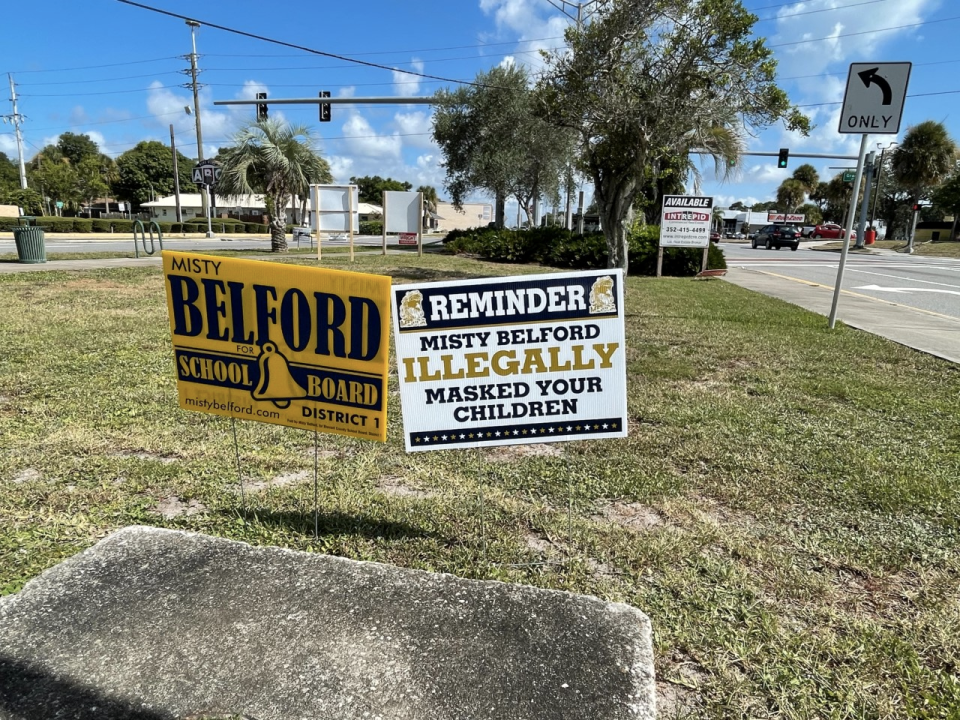
One of the board's first actions this year was to create a policy giving parents greater authority to opt out of subjects considered controversial – related to race, sexual conduct, graphic violence, profanity, and any "material that may be polarizing or likely to divide the community along racial, ethnic, or religious lines." Fox News highlighted the school's district new approach and interviewed the superintendent, who said the policy, "was really a challenge of our school board.”
Despite the sea change in the Woodland Park district, one Colorado outlet that analyzed school board races in the state found that "while conservative slates dominated in districts that already leaned conservative and Republican, teachers union-backed candidates advocating for progressive values won not only in Democratic strongholds but also in many politically mixed areas that swing back and forth along partisan lines."
More than 10,000 school boards across the country
School boards collectively oversee more than 50 million students across the United States.
Their main task is to choose a superintendent – unless that's an elected post, too – and approve or vote down actions brought to them, including many that affect students only indirectly, such as approving contracts for construction or with unions. They also vote on policies such as whether kids have to wear masks at school, can use their cell phones in class or about vaping. Superintendents typically have more influence on day-to-day operations.
There are more than 10,000 school boards across the nation, and thousands of elections happen each year. Some races were held earlier this year or in 2021, while others are aligned with the midterm elections in November.

School board elections in the past have generally been simple productions. Many of these races are nonpartisan, even if those running for office identify as belonging to a political party, and the National School Boards Association said voter turnout often ranges from 5% to 10%. Voters who don’t have children often sit the elections out, contributing to the low turnout.
Many board members run unopposed, with candidates scarce for jobs that typically pay little or nothing, sometimes opening the door to would-be board members with unconventional views. For example, roughly 100 unchallenged candidates in the California Bay Area are expected to join boards without ever having their name appear on a ballot. One antigay candidate had no opponent just days before the filing deadline, until a local newspaper report persuaded a retired school librarian and a lawyer to compete for the open seat.
Low turnout can be a blessing for Republicans, or anyone, looking to plant seeds for wider political change.
Steve Bannon, a White House strategist for President Donald Trump, said in his War Room podcast in May 2021 that “the path to save the nation is very simple – it’s going to go through the school boards.” He later told Politico of local fights over critical race theory that “This isn’t Q, this is mainstream suburban moms – and a lot of these people aren’t Trump voters.”
In addition, the widespread adoption of digital classes and board meetings because of the pandemic gave parents a view into their children’s classes and schools' innerworkings they normally would never have had, Domenech said.
“I can tell you that prior to the COVID years, that school board elections were boring as were school board meetings,” he said. “It’s a business meeting.”
The achievement gap was growing: COVID added fuel to the fire.
Parents who have flooded board meetings before COVID over charter schools, school boundaries or the Common Core state standards might disagree. But with their newly kindled interests, parent groups are now raising concerns, sometimes loudly, about everything from how race is being taught and what districts should, or shouldn’t, do to accommodate LGBTQ students.

Sarah Reckhow, a professor of political science at Michigan State University, said partisan maneuvering for control of schools has been rare, but it has roots in the nation’s school segregation battles, where many white parents and lawmakers fought against students of color learning alongside their children.
Reckhow, one of three authors of “Outside Money in School Board Elections: The Nationalization of Education Politics," said about a decade ago much of the outside spending in local school board elections targeted urban areas. The fights were between fellow Democrats who differed on the value of charter school.
Now, outside spenders are largely focused on uplifting conservative candidates in ostensibly nonpartisan races.
“We’re super used to polarization,” Reckhow said. “It just looks like education is becoming more like other policy issues in some respects.”
What does political polarization look like in school board races?
Last year, Tennessee lawmakers passed a measure allowing local political parties to offer up school board candidates with a Republican or Democrat label, though school districts aren't required to host partisan elections. Candidates also can run as independents.
In Knox County, Tennessee, Republican candidate Will Edwards raised more than $100,000 – nearly triple that of his Democratic counterpart Katherine Bike, to advocate for his platform of ensuring every third grade student can read, but also to deliver, "great education, not political indoctrination." Bike campaigned on a platform opposing charter schools. Knox County has roughly 486,000 residents and about 80% identify as white only, according to U.S. census data.

Bike and Edwards had been competing for the seat vacated by board member Virginia Babb, who departed in protest of the new partisan elections. She told Knox News “I am not a Republican. I'm not a Democrat. I'm not going to do that just because they changed the rules of the game now.”
Bike won the August contest by fewer than 150 votes.
A tug-of-war over education policies?: Critical race theory, mask mandates dominated 2021 school board elections
In Texas, local political action committees poured money into school board races, and one funder, cellphone company Patriot Mobile Action, spent more than $400,000 to flip four school boards in Tarrant County in the Dallas-Fort Worth area.
"Every child in America should be educated with the values of American exceptionalism," the group states on their website. "Critical Race Theory and Marxist policies have no place in schools or government."
Of Tarrant County's 2 million residents, about 43% of identify as white alone and not Hispanic or Latino.
That level of investment in school board races is unusual, said Rebecca Deen, a professor of political science at the University of Texas, Arlington, and it's unlikely to subside with funders notching wins.
Some Texas parent also have formed PACs to influence local elections. They often zero in on how race is taught or question the value of students' access to some books on gender and sexuality.
It was the Southlake Families PAC, a group describes itself as "unapologetically rooted in Judeo-Christian values," that helped to establish the model of local conservative parents raising money to influence their school boards. The PAC was started in response to a diversity plan developed by the Carroll Independent School District in Southlake, Texas.
They said the district's approach was a "highly political plan seeking to indoctrinate children according to extremely liberal beliefs," and the PAC often criticizes critical race theory. The group's candidates in November swept the school board in a district about 8,300 students, including 60% who are white, 20% who are Asian American and 10% Hispanic.
That’s similar to what’s happening nationally when local parents groups organize under the umbrella of groups such as Moms for Liberty and Parents Defending Education. These groups describe themselves as grassroots organizations focused on education issues, but critics say their advocacy around race and gender issues suggests they are more partisan than they claim.
Moms for Liberty has more than 200 chapters across 40 states. The local groups operate independently but share concerns over issues such as vaccine mandates and how districts should teach about race and sexuality. Moms for Liberty describes itself as non-partisan, but its affiliates tend to endorse conservative candidates and are often featured on outlets such as Fox News. At a July political rally, it hosted speakers including Florida Gov. Ron DeSantis, a Republican, and former Trump-era Education Secretary Betsy DeVos.
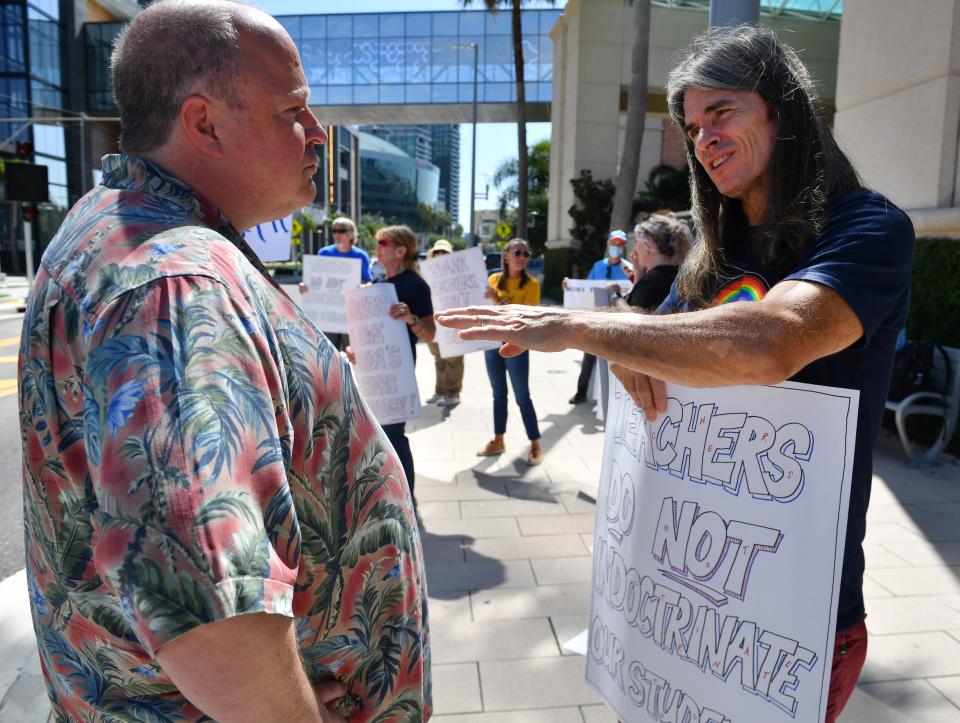
She added success in these races isn’t just about outside money or endorsements. Those with closer ties to the schools, either through parent-teacher association groups or local volunteering, may have better chances in elections regardless of how much they spend or who advocates for them.
Sometimes, the backing of a politically divisive group can weigh a candidate down. In Boise, Idaho, this year, a board member appointed just a year ago to fill a vacancy was ousted by a young challenger. When he took office in 2021, incumbent Steve Schmidt said “I’m hearing some crazy things about school boards,” adding later that the climate surrounding boards “seems very politically charged right now for something that should just be focused on what’s in the best interest for our kids.”
But his reelection campaign was backed by the Idaho Liberty Dogs, which complained about offerings at the local library, among other issues. The group describes itself as "America First, Vets before illegals, and the laws of our land. Preserving Idaho's conservative values and keeping her red is important to us."
Shiva Rajbhandari, Schmidt's 18-year-old challenger, called on the incumbent to disavow the endorsement. Schmidt ultimately lost, in part because of an energized electorate. Back in 2020, in Boise, Idaho, about 7,700 people voted in a school board election. This year, more than 20,000 voters weighed in, though all but one of the incumbents held onto their seats.
Rajbhandari beat Schmidt by almost 2,500 votes.
The Boise school district is a part of Ada County, home to about 500,000 people, 84% of whom identify as white and not Hispanic.
'We try very hard to filter out the crazy'
The low turnout and voter interest in school board elections are part of what motivated Girdusky, the head of the Project 1776 PAC, to get involved in the races. All he had to do, he said, was get more conservatives to turn out than liberals, which can be easy when working with a smaller voter pool. Girdusky worked in state and national political races for a decade and a half before starting the Project 1776 PAC.
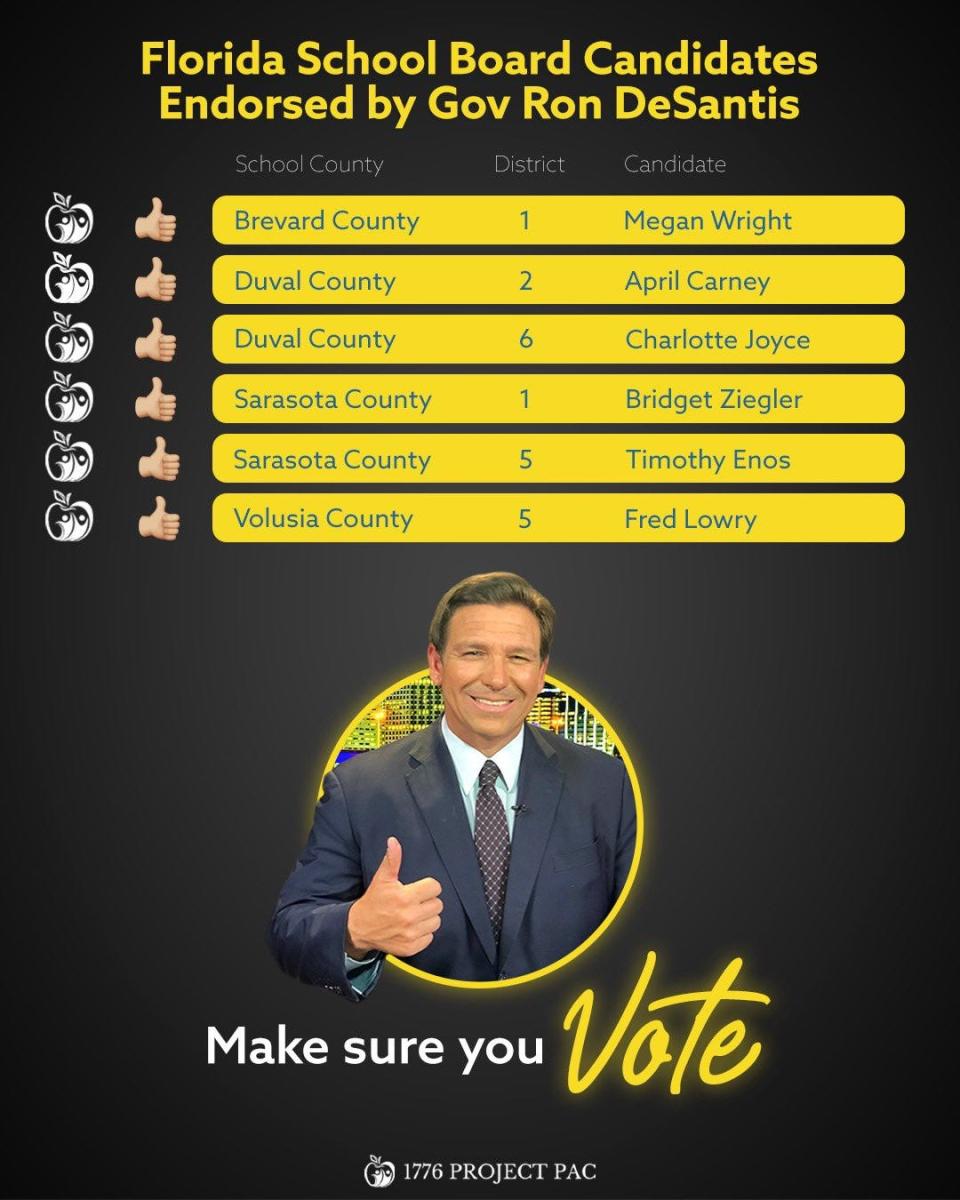
The year referenced in the PAC is when the Declaration of Independence was signed, and many in conservative circles cite the date in response to the New York Times’ 1619 Project, a collection of journalism that documented the role of slavery in the nation’s first days. The PAC describes itself as “committed to abolishing critical race theory and ‘The 1619 Project’ from the public school curriculum.”
Students walk out, parents rage: What's happening as some school boards become more political
Girdusky’s focus on race has paid off, and he said about 70% of the candidates the PAC backs go onto to win their races.
“If this was a political boogeyman and I was making this up,” Girdusky said, “I could not have this success.”
He said the concept of CRT – that racism is systemic – is affecting how students are taught about history and power. Girdusky finds some candidates sympathetic to the cause through recommendations, while others seek out Girdusky for themselves.
That was the case for Will Furry, who is running for school board in Flagler County, Florida. That county is home to about 120,000 people, most of them white, according to 2021 census data. Like many parents running for school board, Furry’s interest in local education began during the pandemic. He was frustrated with school lockdowns and mask mandates, and he said he wants to see educators focus on “learning, rather than on political and social issues.”
He also cited as a cause for concern the inclusion of books in school libraries that he considers inappropriate age-wise for some children, including “All Boys aren’t Blue,” a memoir by George M. Johnson about growing up Black and queer.
Furry doesn’t have a political background. Instead, he lists his experience as a realtor – who won the backing of the Flagler County Association of Realtors – a Christian who volunteers, and father of two elementary school students. One of his friends mentioned the 1776 Project PAC, and Furry saw on the website that he could request an endorsement.
After he filled out the questionnaire, the group reviewed his campaign website. He then interviewed with its organizers, who asked him about his stance on issues related to CRT. He earned their endorsement and went on to win his primary in August.
“Bottom line on CRT is it stems from a Marxist ideology, and teaches kids to hate each other and their country,” Furry said. “And I am not for that.”
Girdusky said in reviewing candidates he ensures they have a basic understanding of education issues and are trying to get elected on their own. He or his associates also make sure they have a connection to the schools.
“We try very hard to filter out the crazy,” Girdusky said.
Recall efforts target school board members
School board candidates looking to change the curriculum or policies have the most impact if they can win majority shares of boards, according to Doug Kronaizl, a staff writer for Ballotpedia. He said the publication’s research found incumbents running on controversial issues lost at a higher rate compared with previous elections the group had tracked.
“It’s less likely that you’re going to see the policy for a school district change after a single election,” Kronaizl said. “If you defeat a school board president, or, you know, somebody in a leadership position on the board, that can change what’s happening.”
Some voters aren’t waiting for elections to make their will known. From 2006 to 2020, there were an average of 23 recall efforts against an average of 52 school board members each year, Ballotpedia found. That changed in 2021, when there were 92 school board recall efforts against 237 members.
The motivation for recalls vary widely, but many cases in the last year were focused on schools’ responses to the coronavirus, including mask mandates or holding classes online. These efforts usually require a set number of voters to sign a petition before the recall vote can be held.
'Taking control of our own lives': Virginia students walk out over reversal of transgender protections
Gabriela López, 30, knows personally the toll a recall takes. She first ran for office after Trump won the presidency in 2016, joining nearly 30 candidates for San Francisco’s Board of Education.
López, a former public school teacher and an adjunct professor at the University of San Francisco, said few other candidates had worked in public education. López was serving as board president when she and two other members were recalled in February 2022. It was the first recall of city officials in recent memory.

Parents who supported the recall were frustrated that the board had spent time trying to rename schools during the pandemic rather than trying to reopen them. The board had planned to rename institutions named after historical figures, including past presidents George Washington and Abraham Lincoln, as well as Sierra Club founder John Muir, whose legacy has been marred by "derogatory comments about Black people and Indigenous peoples."
She is running for the board again in the November general election. López said she recognizes the frustration that parents felt, but she was trying to address the competing demands from her constituents, some of whom felt harmed by the schools’ name.
At the same time, López said she tried the balance the desires of “families who really wanted their students to be in-person in our classrooms learning and families who were just full of fear of COVID.”
The recall seems to have had a limited effect on stemming controversy within the board. It just voted to censure member Ana Hsu for comments suggesting that the most significant challenges facing Black and brown students are a lack of parental involvement.
Hsu had helped collect hundreds of signatures for the recall effort involving López.
Contributing: Kathryn Varn, USA TODAY Network-Florida; Becca Wright, Knoxville News Sentinel
Contact Chris Quintana at (202) 308-9021 or cquintana@usatoday.com. Follow him on Twitter at @CQuintanadc.
This article originally appeared on USA TODAY: Republicans running on race, see gains in school board election races

